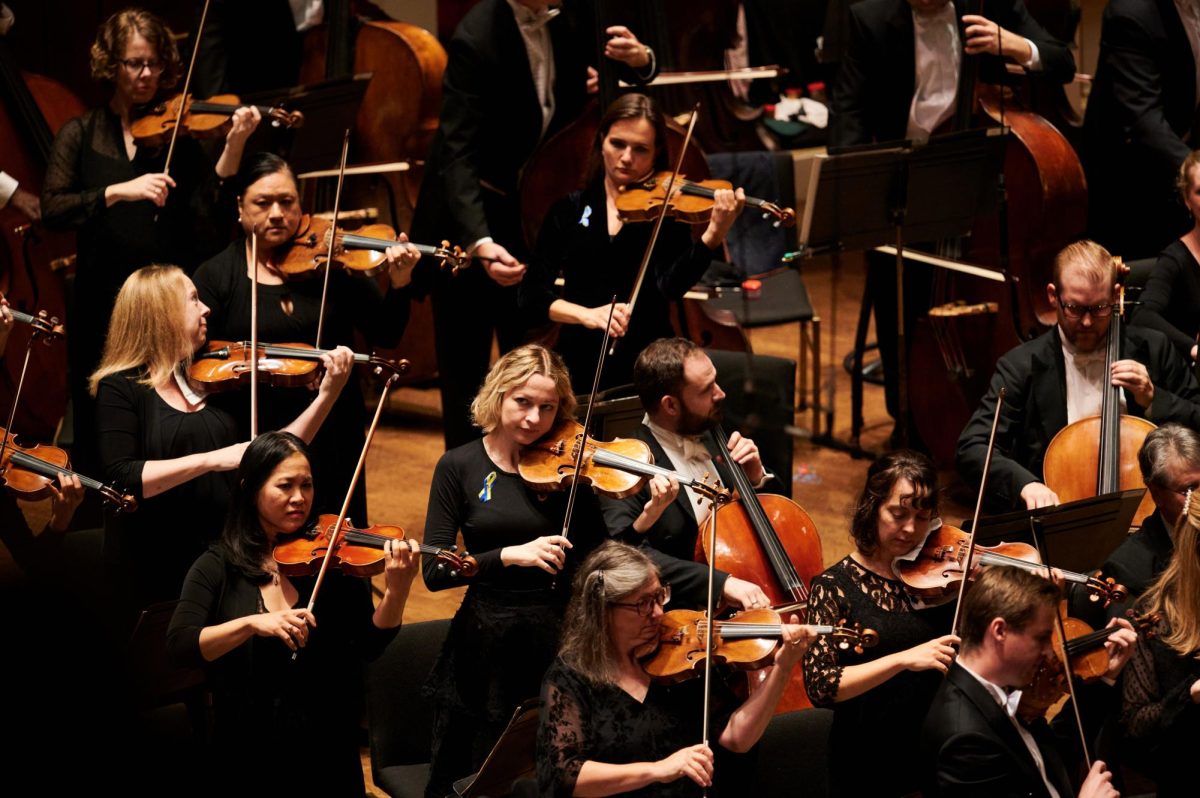In the midst of the historical architecture and gleaming chandeliers of Heinz Hall, the classical music of the Pittsburgh Symphony Orchestra (PSO) swayed listeners with “The Sounds of NOW” during the PSO’s opening weekend from September 29 to October 1.
The performance included Russian composer Sergei Rachmaninoff’s Symphony No. 2, written in 1907, and German romantic era composer Robert Schumann’s Piano Concerto in A minor, written in 1845.
Mary Persin, the vice president of artistic planning for the Pittsburgh Symphony Orchestra, enthusiastically detailed the highlights of the Opening Weekend program. Persin said the dynamic lineup of musical talent showcases the diverse range of performances held by the PSO.
“Our Opening Weekend program included 3 major works,” Persin said. “First, Mexican living composer Gabriela Ortiz’s Kauyumari, which was the very first time that we presented a piece by Gabriela Ortiz in Pittsburgh. Next, French piano sensation Helene Grimaud joined to share her exquisite interpretation of the Schumann Piano Concerto. Rachmaninoff’s lush and romantic Second Symphony closed the program.”
Persin said that she strongly values inclusivity when considering what pieces to perform at the PSO. She said the PSO considers a multitude of factors such as heritage months and anniversary celebrations.
“I aim to choose a repertoire for opening weekend that uses a very large orchestra so that all of our players can be included,” said Persin. “Additionally, this program was a nod to two important occasions — first, National Hispanic Heritage Month, which runs Sept. 15 to Oct. 15, hence the Ortiz, plus 2023 being the 150th anniversary celebration of Rachmaninoff’s birth.”
Susy Robison, the former director of volunteers at the PSO, said that she considers classical music to be its own language. Robison discussed the importance of classical music to cultivate the mind.
“I believe very strongly that music is a language, just as you would speak Spanish or study mathematical languages,” said Robison. “If somebody is interested in developing their mind, they can gravitate towards music, especially classical music.”
Erin Lynn, director of audience experience for the PSO, said classical music is for all listeners, especially considering its history as a rebellious art form. Lynn said anyone can listen to classical music if they change how they view it.
“Classical music now is seen as such a stoic, traditionalist, and elitist art form, but when it was being composed and performed initially, it was the rock stars and pop music of that era,” Lynn said. “To have that mindset change and to think about those artists broke the mold every time they composed something shows that it can be for everyone.”
Lynn said the PSO is trying to reach a college audience and is working towards spreading classical music to a larger group of people. The goal of broadening the audience led to the inception of their program PSO Disrupt, designed to cater specifically to individuals who are less familiar with classical music.
“We’re trying to introduce what can potentially be considered intimidating music,” Lynn said. “It takes one piece or two of music, it has commentary from the stage and it dissects and gives explanations, and insights into the music, so even if you don’t know Beethoven’s seventh symphony, you can come and listen to it, and have someone explain it to you.”
Robison said she’s a strong believer in incorporating classical music into her life and the lives of younger generations. Robison said children learning about classical music is an endearing and heartwarming experience to witness.
“We need to get our children trained in music – other countries are way ahead of us, which is why the Pittsburgh Symphony has the Fiddlesticks concerts,” Robison said. “The students would come in buses, and they’re children so you can just hear them as the concert was getting started, and it was like [a] waterfall with all their little voices.”
According to Lynn, the way to understand and appreciate classical music is by recognizing its history and finding relatability. Lynn said the PSO’s Disrupt concerts are a great start for unfamiliar listeners.
“While classical music may seem archaic and not for everyone, it actually is [for everyone], you just have to find your road,” Lynn said. “We’re trying to give people that walk in the door to a relaxed atmosphere with activities and musicians to talk to before and after, there are visuals and there’s a discussion during, people can feel less formal about having to sit in a concert hall.”
Lynn said the greatest asset to PSO is the artists who perform at every show and communicate with their audience.
“The musicians, they’re our best marketing tools that we have because they’re the ones that perform,” Lynn said. “If the audience member gets to see that a musician is speaking with them they’ll see humans who just happen to be experts at what they do at the stage. To show them as the actual artistry here is something we’re trying to personify, they’re also just members of the Pittsburgh community.”
Persin said she will continue her role of bringing different artists to the Pittsburgh community throughout the season. She added that the PSO has a variety shows planned for the upcoming months, some of which will incorporate younger talent.
“I love to present new and outstanding names and faces on the Heinz Hall stage,” said Persin. “Coming up in November, the Korean violin sensation Bonsori will make her Pittsburgh Symphony debut, as well as American violinist Randall Goosby. Both of these violinists are fantastic names, but also quite young — in fact, not very much older than college-age students!”



